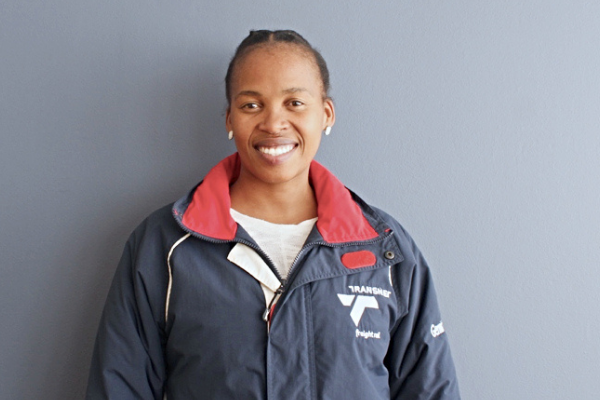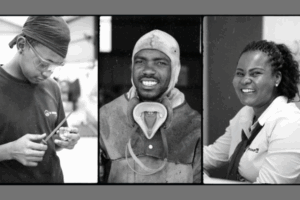Siphiweokuhle Sithole, 31, United National Transport Union
How did you get involved in the Young Women Leadership Development Programme of LRS?
Nine years ago when I joined railway parastatal Transnet, we were just eight women and none of us was in a leadership position. Because all supervisors and shop stewards were men we didn’t have a proper gendered lens in union functions such as organizing and collective bargaining.
I grew up in a community that didn’t value educating the girl-child. A girl-child just needed to grow up, get married and start a family. In retrospect, I wish my foundation was better, stronger and purposeful about education and career choices. I want my 8-year-old daughter to have option to be whatever she wants.
When the facilitators of the Young Women Leadership Development (YWLD) called my union, The United National Transport Union (UNTU), urging for applications to join the programme, I jumped at the opportunity. I work as a train builder and so I am familiar with the struggles of women workers in male-dominated industries. My motivation for joining YWLD spoke to the status quo and the need for working together to change and create environments for women workers to thrive. For this to happen, young women must have agency, opportunities and the tools needed to excel.
What have you learned through YWLD?
The first day of the programme was quite impactful. I got the opportunity to meet and learn from many women who’ve broken the glass ceiling in their respective fields. We met a lot of powerful women who genuinely desired to share their experiences and to give empowering advice. I left the meeting elated and with the seed of empowerment firmly planted in me. I wanted to make a difference through sharing what I had learned. It’s important to share knowledge with especially young girls and women.
The YWLD empowered us to lobby for gender issues, including the workplace issues that affect us directly. For example, my performance is measured by among other things good attendance. I found that measurement problematic because it discriminates the women on maternity leave. So, we put the issue forward as a demand and they’ll consider it during negotiations.
I was very shy before coming into this programme, but now I have blossomed. The support we get from our peers in the programme and LRS facilitators is incredible. Now I am championing issues that I never thought I would ever speak about. I feel inspired and empowered to seek a managerial position at my workplace, and I am currently looking for a mentor to help me prepare further. The YWLD programme revealed to me the world working to tackle women rights in workplaces, patriarchy and gender-based violence. The programme exposed me to comrades working in different workplaces – government, private sector and trade unions – and I am grateful. We come from different backgrounds and that makes peer learning very rich. We have similar goals and are working together to achieve the goals. This is important for growing the labour movement, which is facing a new era.
How are you sharing the knowledge you’ve acquired?
During the course of YWLD, we got involved in a project for distributing sanitary pads to underprivileged girls. That project morphed into an empowerment platform for young women that we now use to cascade the knowledge and information from the YWLD programme. I am using the platform to encourage young girls to foray in male-dominated fields, for instance. The girls we are mentoring are inspired to achieve a better life. They are interested in studying science and want to be leaders in the future. One of the girls pointed out that there aren’t many women in top leadership positions in the South African National Defence Force. She aspires to become a top shot in that field, and am pleased to see a shift happening. A few women leaders have taken up top positions (the current Minister of Defence and War Veterans is a woman and a woman once led the police ministry). This prompted me to look for ways to encourage more girls to break stifling norms. There are many South African women who’ve excelled in their respective fields – our unsung heroines. Perhaps we need to surface those examples more so that young girls can have even more role models to emulate.
What are the (unexpected) issues that emerged after you joined YWLD programme?
I think our work is cut out for us. Some older male colleagues now think am ‘too opinionated’. I am told they wanted to dislodge me when I went on maternity leave. And I have been called ‘disrespectful’ because I speak out in company meetings about the issues that I am passionate about, especially concerning women colleagues. But my contention is that at the workplace everyone has a right to be heard. Not everyone wants to challenge patriarchy and advocate for transformed workplaces. I have been silenced a few times by especially older men, saying “ubazi thula (keep quiet), now the men are talking.” But I think our efforts matter to the young male workers. My quest to find a suitable mentor hasn’t panned out as I would have liked. Many of the women I have approached say they have very busy schedules. Due to my experience, I am not entirely convinced that the male leaders that can potentially act as my mentors will offer to do so without expecting something from me in return. Getting mentoring services for free isn’t a given, and that’s unfortunate. Yet, not all of us can afford to pay professionals such as life coaches.
Some people argue that women ‘expect to be given things’…
Ingrained bias (in society) and workplace cultures mean we can fail to see the leadership potential of women. Women are routinely underrepresented in leadership roles, and yet we are the majority in the population and many of us are qualified. So, are the doors being shut deliberately? I believe so, and we need to clearly establish and communicate the existing limitations for women (we’ve pondered those dynamics in the YWLD programme) and find ways of dismantling the structures that reinforce patriarchy and masculine leadership cultures. Mentoring for all girls and boys, and from an early age, should be the norm.
* The LRS Young Women Leadership Development (YWLD) was made possible through the support of the ILO.







